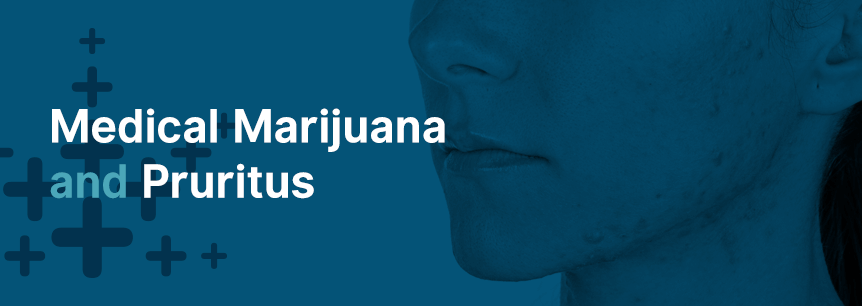
Many skin conditions can cause pruritus, including dry skin, eczema, and psoriasis. Pruritus can also be painful and is one of the most common complaints patients relay to their primary care physicians and dermatologists. Its symptoms can be relentless when severe and persistent, impacting your sleep and quality of life.
The good news is, medical marijuana for pruritus can help relieve not only the itching and pain, but some other symptoms, even depression, and anxiety.
There’s no cure for psoriasis as of yet, but medical cannabis for pruritus can play an important role in managing your symptoms in the following ways:
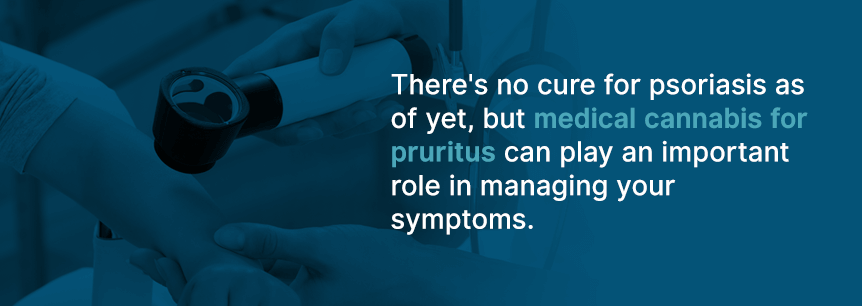
Find A Doctor Find A Dispensary
Your endocannabinoid system in your body has receptors that bind with marijuana’s cannabinoids. The two primary receptors are:
Cannabinoids have anti-inflammatory properties, making them potentially useful in treating a wide range of skin problems, according to a study the Journal of the American Academy of Dermatology published. The study concludes cannabinoid-infused pharmaceuticals might be effective against conditions like:
In one study, eight of 21 patients who used a cannabinoid cream two times a day for three weeks eliminated severe pruritus. The medication might have decreased the dry skin likely causing the itch.
Researchers believe the main driver in cannabinoid treatments is their anti-inflammatory properties. In studies the researchers reviewed, they found THC helped reduce inflammation and swelling in mice.
Some strains for inflammation to try are:
There are many other strains for inflammation, but these in particular help with inflammation due to skin disorders.
Psoriasis is a condition that can cause pruritus, along with a lot of discomfort and pain. It is an autoimmune disorder making skin cells multiply more quickly than normal, which causes immature skin cells called keratinocytes to come up to the surface before fully developing. This leads to patches of painful, itchy skin. It’s believed medical pot helps individuals with psoriasis, and therefore pruritus, manage their symptoms in a few ways:
You can try these strains for relieving pain:
There are also medical marijuana and pruritus strains that work for both inflammation and pain. As a bonus, they also help with other symptoms like depression and insomnia.
If you’re allergic to cannabis, it can cause itchiness. However, if you’re not allergic to marijuana, it can have the opposite effect for conditions causing intense itchiness and pain, like psoriasis.
Marijuana for itchiness works on various fronts to decrease the hyper-proliferation of cells, minimizing the patches of irritated, dry skin and thereby reducing the itch.
Anti-itch strains to try are:
Hempseed oil, derived from cannabis sativus, is helpful for treating eczema, another skin condition that causes pruritus. Hempseed oil also helps with other skin conditions such as:
All of these can cause pruritus or itchy skin.
Hempseed oil helps to strengthen the skin, making it better able to resist viral, bacterial and fungal infections.
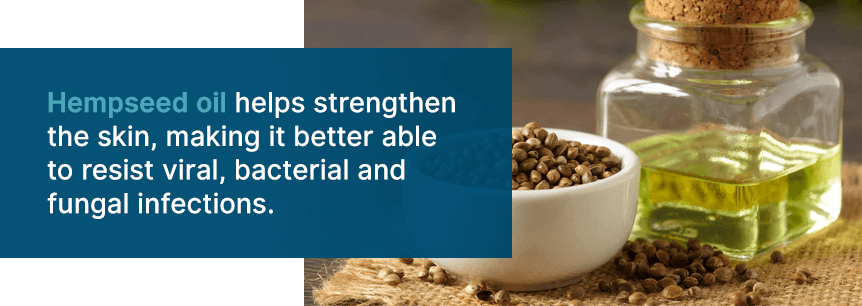
Hempseed strains grown and used to produce hempseed oil are low in resin content already, and after they’ve been through the manufacturing process, washed and pressed, what’s left is a product with no THC or psychoactive compounds.
When choosing strains to help strengthen your skin, you’ll want to choose strains rich in CBD. CBD, when infused in oils or topical treatments, helps with many dermal skin problems.
Besides relieving itching and inflammation, which pruritus shares with eczema. Medical marijuana for pruritus can help with:
Even though marijuana is effective for pruritus, it does have some side effects of its own, including:
Discuss these and all other possible side effects with a doctor before you begin cannabis for pruritus treatment.
Pruritus patients might not want to smoke medical marijuana to receive its benefits since it could trigger a flare-up. Instead, pruritus patients may benefit more from applying a cannabinoid oil topical directly to their skin.
Many topical steroid creams doctors often prescribe to patients for conditions with pruritus can come with hazardous side effects, like the potential to develop lymphoma or tuberculosis. Cannabis for itchiness is ideal for any inflammation and irritations of your skin since it’s just as beneficial and therapeutic as other anti-inflammatory medications, but without the side effects. CB2 receptors in an individual’s skin have been shown to react positively to cannabinoids, leaving skin improved and feeling healthy.
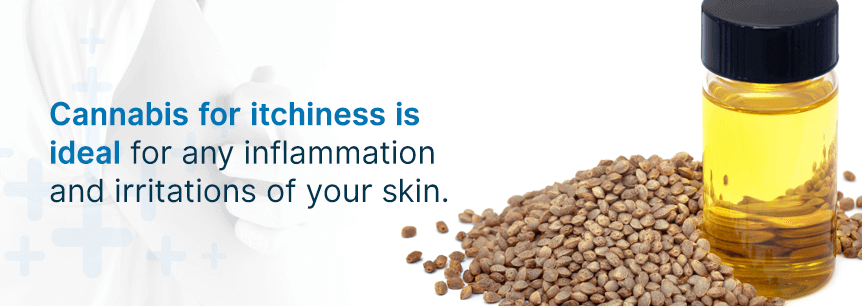
Applying medical marijuana for pruritus topical cream or oil to the affected areas can help decrease the inflammatory response and cut down on the irritation which causes you to scratch, allowing your skin to heal. You apply topical cannabinoid treatments, which have no psychotropic effects, directly to your skin.
You also have the choice of salves, balms, hempseed oil and ointments, all infused with cannabis, within the topicals family. Outside of topicals, you can try edibles and tinctures.
The field of pruritus research is constantly changing, and medicine has already made many advances this decade. In particular, there have been steps forward in the understanding of chronic itch and scratching, including:
A few new therapeutic interventions for pruritus have proven successful. Also, there have been clinical trials conducted to help reduce pruritus, such as:
You have an abundance of resources available to you here at MarijuanaDoctors.com to help you decide if marijuana for itchiness is right for you. You also have a variety of choices of cannabis-infused pruritus products to help heal your skin.
For additional information on pruritus and how cannabis can help, you should speak with a medical cannabis doctor. They’ll answer your questions and potentially give you a recommendation for medical weed treatment. Book your appointment today.
Find A Doctor Find A Dispensary
Pruritus, also known as itchy skin, is an irritating, uncomfortable sensation causing you to want to scratch. Dry skin is a culprit of pruritus and tends to worsen with age. But, as mentioned, there are many different causes for itchy skin and the cause determines the severity of how itchy your skin can become.
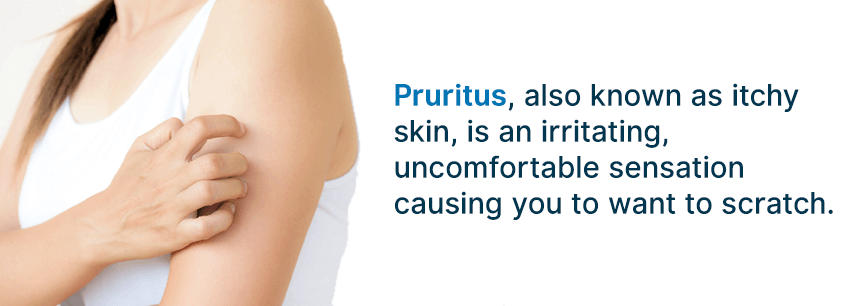
Depending on the cause, your itchy skin could appear normal, or you could have rough or red patches on your skin or blisters or bumps. The more you scratch, the more chances your skin can become inflamed, bleed or infected.
While anyone can develop pruritus, certain groups of individuals are more vulnerable to the condition, including:
There are several types of generalized pruritus:
Your itchy skin may occur in small areas like on a leg or arm, or it can affect your entire body. It can develop with no other noticeable skin changes, or it can appear with:
The itching can be intense and last a long time. As you scratch or rub the area, it becomes itchier. And the itchier it becomes, the more you scratch. It can be difficult to break this cycle of itching and scratching, but you risk skin damage and infection by continuing to scratch.
Pruritus can be generalized or localized and can come on as an acute or chronic problem. Your itching can last over six weeks, thereby becoming chronic pruritus. The itching you experience can be uncontrollable and incapacitating. It can also become a diagnostic and therapeutic challenge.
While there’s no one mechanism to explain all pruritus causes, many health conditions can cause itching of the skin. Some common causes include:
Histamine, which mast cells release in individuals with allergic reactions like urticaria, classically links with pruritus. But, except for allergic conditions, histamine is just one of a few chemical mediators of itch.
Besides, opioids cause pruritus in up to 90 percent of individuals receiving intraspinal narcotic injections.
Pruritus can impact the quality of your life. Prolonged scratching and itching might increase itch intensity, potentially leading to:
In many cases, like that with eczema, you shouldn’t scratch your skin no matter how itchy it is because it can make it worse, cause you to bleed and even lead to infection.
Pruritus is often a distressing symptom, and, when chronic, can profoundly impact a person’s mental well-being. In a study published in Clinics in Dermatology, far more individuals with idiopathic generalized pruritus were shown to have depressive symptoms compared with controls.
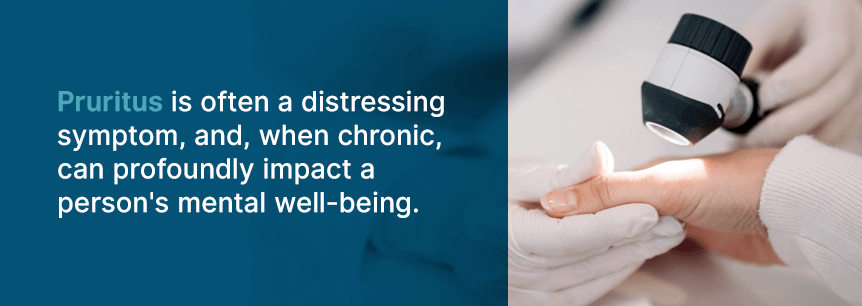
Atopic dermatitis patients can have a substantially higher level of anxiety, depression and suicidal thoughts. Researchers found an increased severity of the disease could predict depression and stress a day later.
Numerous studies of different diseases have shown the negative effect of pruritus on an individual’s psychology and quality of life. The intensity of itch was shown to negatively correlate with quality of life, coping behavior and sleep in children with atopic dermatitis.
In psoriasis patients, the intensity of itching correlated with:
In another study on psoriasis patients, pruritus was shown to impact patients’:
Researchers also found pruritus links with worse mental health and physical functioning in individuals with systemic sclerosis.
For a while now, epidemiological problems seemed to have played only a small role within dermatology. One reason could be dermatology is a relatively young field, having advanced around 1850 as a distinct specialty.
Only a few years ago, the term dermatoepidemiology came about and is now closely associated with principles of evidence-based medicine. Its significance over time has increased in acknowledgment of the fact many skin disorders aren’t just highly prevalent —like eczema and psoriasis — but also on the rise, to where it’s said to have thrived over the past 10 years.
Identifying the cause of pruritus and treating any underlying skin conditions is the first step in eliminating pruritus. After identifying and treating an underlying condition, most treatments for pruritus include home remedies and medication additions or changes.
Taking care of your skin is the best way to prevent itching. To protect your skin:
If doctors suspect a drug reaction, switching to a different drug could help reduce the itching. But, many medication reactions also have an accompanying rash along with the itching.
Your doctor might also give you a prescription for antihistamines or topical steroids to treat pruritus. However, many medications come with side effects, and antihistamines and topical steroids are no different.
Side effects of antihistamines may include:
Side effects of topical steroids may include: